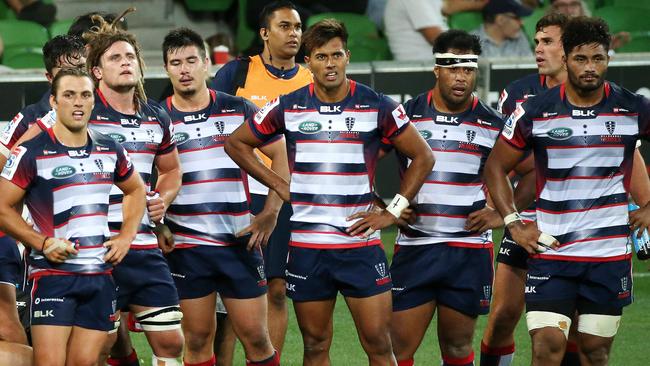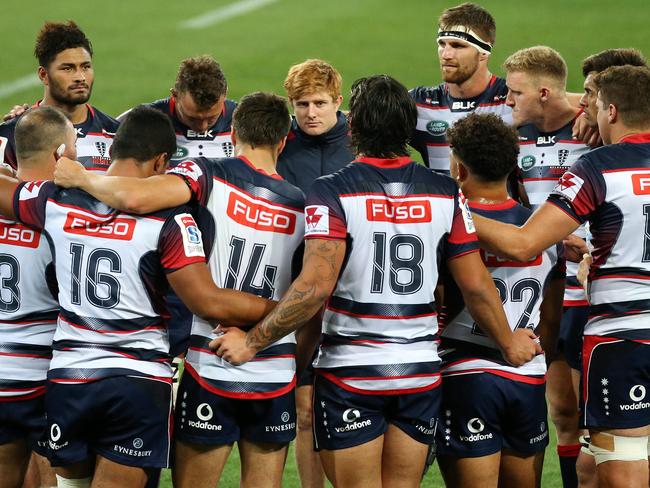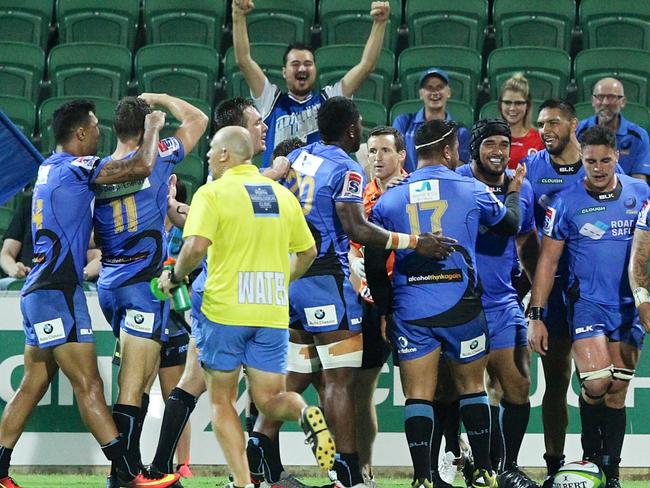Brendan Cannon: Rebels most vulnerable but Australian rugby must get house in order or perish
AUSTRALIAN rugby would be wise to not ignore the urgent need for change in our game. Put bluntly, the game currently isn’t viable long-term in Australia, writes BRENDAN CANNON.

Rugby
Don't miss out on the headlines from Rugby. Followed categories will be added to My News.
THERE are plenty of anxious people waiting to see what happens to Super Rugby when SANZAAR bosses meet in London this week. The competition needs to blown up. That much is clear.
There is the chance an Australian team will be cut and I really feel for the three franchises in limbo — the Rebels, Force and Brumbies. There is so much uncertainty and anxiety, they’d be getting up each day for work wondering “what am I doing this for?”.
The Brumbies are probably a safe bet, so it would come down to the Force or the Rebels.
Perth was established because it truly creates a national game for Australia by being in the west.

I know I will be perceived as being biased given my history with the club, but taking that Force hat off and looking at it from a national perspective, rugby in WA has a good foothold and good growth prospects. There is an eclectic mix of people who like rugby, and with no NRL team and only two AFL teams as rivals, it can succeed and keep producing Wallabies.
The Rebels have the considerable safety of being privately owned but the trouble I have with Melbourne is this nagging thought: is it worth the effort?
Is it honestly worth the effort to invest all that time and money to only just survive in the background of an overwhelmingly AFL state?
Should our energy and resources be better spent somewhere else, where you don’t have such a behemoth to compete with? Why go up against the heavyweight champion in his own backyard?
The Rebels have a band of loyal supporters, no doubt, but you have to ask will it ever be anything more down there? Rugby is always going to be the third or fourth cousin.
Ultimately, I’d love it if Australia kept all five teams and knowing the political mess that is SANZAAR, it would be no surprise if that’s what happened.
But Australian rugby would be wise to not ignore the still urgent need for change in our game.
Put bluntly, the game in its current state isn’t viable long-term in Australia.
You have four Australian franchises effectively needing handouts from the ARU just to stay afloat, and even the Rebels get financial assistance too. It’s unsustainable.

It’s not scaremongering to imagine the ARU, a few years down the path, potentially going into receivership and effectively have to be governed by World Rugby. With ever-dwindling revenue, it just can’t keep giving out money.
So instead of talk about our franchises and whether we should keep five or cut one, how about we keep five and BECOME one?
This is the moment for Australian rugby to copy the successful governance structure of New Zealand rugby. It’s time to centralise.
This is an opportunity for the ARU, the franchises and the stakeholders to say: “You know what? Long-term survival is what matters the most, let’s stop protecting our own patch and focus on the greater good of rugby in Australia.”
We have come from amateur, state-based tribalism where you instinctively didn’t want to share with your neighbour because they were the enemy.
Times have long since changed in the modern world but we are still eating our own and killing each other, trying to protect our own little corner of Australian rugby.
Let’s throw out those petty rivalries and work out how to we can most thrive together.
In the global economy, the better businesses are the ones that centralise. They have greater economies of scale, and cost savings are produced through aggregation, and sharing processes and procedures and personnel.
If we are going to maintain five teams and stay financially sustainable, control and administration of the game needs to be centralised through an ARU structure.
Just as we have the NRL commission and the AFL commission, we need a Rugby Commission.
Contracting should go through the ARU too, where the national body has a great role in spreading the talent around the teams.
Australian rugby is at a crossroads and we must all be honest: what will happen in five years if major change is not put down on the table. Right now.
And not just by the ARU. All the self-interested stakeholders must also ask what is in the biggest interests of the game, not just their own.
Let’s use this chance to kick down all the rusty old fences in Australian rugby once and for all.
Let’s all stand in the one paddock together — the one rugby field together — and start looking at the same tryline out in front of us.


